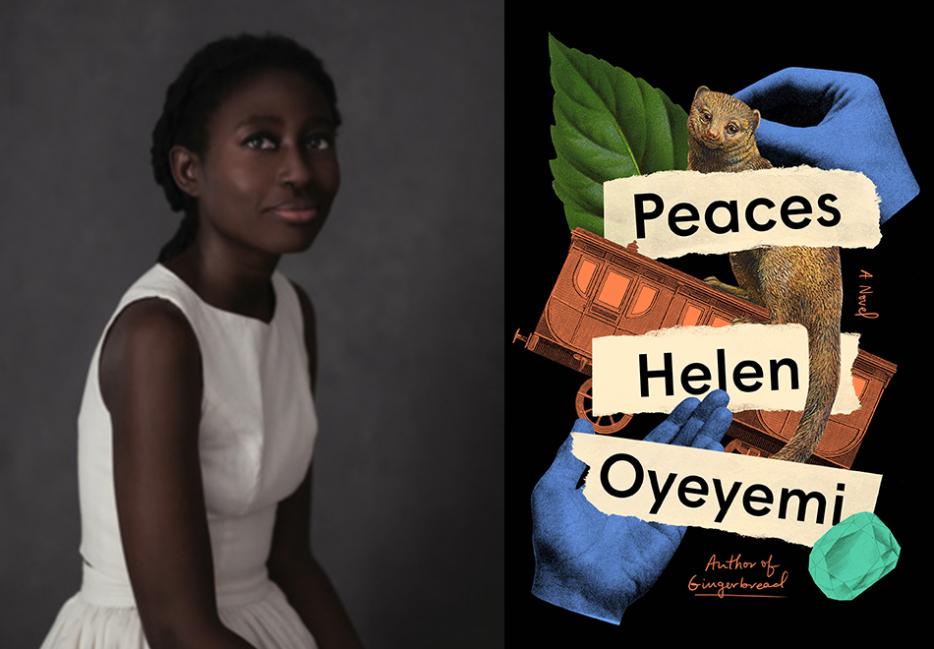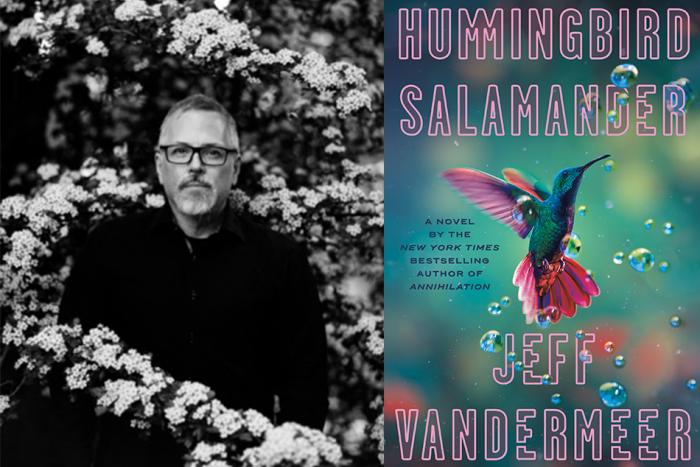Helen Oyeyemi’s novels and stories are never simple narratives; they often include stories within stories, questionably real apparitions or places, and ambiguities galore. Ambiguity isn’t something we seem to like much these days. Uncertain times (although what times have ever, really, been certain?) seem to evoke in us a need to be certain, a desperate desire to have some fixed things in the midst of all the unknowns.
Yet there is pleasure to be found in ambiguity, in uncertainty, in letting go of the belief that there is only one truth, one reality, one way of seeing things. There’s an existential kind of joy in wrestling with the gray areas and letting them remain so. At least, that’s how I’ve always felt when reading Oyeyemi’s work: joyfully along for the ride, letting her questioning narratives unspool without answers, finding satisfaction in the telling itself rather than the resolution.
Oyeyemi’s latest novel, Peaces (Hamish Hamilton), is—there’s really no other way of saying it—a romp. That doesn’t mean it isn’t serious, because it is, but it’s also fun, twisty, surprising, and sometimes tender. Largely narrated by Otto, who has just taken his partner Xavier’s last name (Shin) in lieu of a wedding, the novel follows the pair as they take a non-honeymoon honeymoon aboard a privately-owned passenger train. The train’s owner, Ava Kapoor, could be considered a recluse, as she’s been living on the train for some five years, but she’s not its sole occupant: her girlfriend, Allegra, is one of the train operators, and another woman, Laura, lives on the train with them as well. Over the course of their strange ride, Otto, Xavier, and their pet mongoose get into all sorts of shenanigans that test their relationship, how well they know one another, and unearth something—someone?—shared in their past. Meanwhile, they learn that Ava needs to prove her sanity a few days hence in order to receive a large inheritance bequeathed to her by a former employer. Despite the fact that she lives on a train and plays a theremin, Ava appears rather on the sane side—except for the fact that she’s never been able to see that former employer’s son, Přem.
I recently spoke to Oyeyemi, who lives in Prague, via Zoom.
Ilana Masad: I loved Peaces so much. Could you tell me a bit about the title and how you arrived at it?
Helen Oyeyemi: I think it's probably connected to the epigram. So the epigram is this poem by Emily Dickinson about thinking that peace has arrived, or that one has arrived at peace—but there's always another frontier to arrive at. It’s a sense of ongoing war. And instead of peace, it's a sort of illusory lull between battles. I think that's maybe what relationships are. A kind of a bleak view on relationships, but also on arriving at any kind of certainty in terms of perception or existence or any of the things that we're trying to deal with as human beings. And just packing it all into a one-word title.
I’ve noticed your novels—and stories, too—becoming more openly queer over the years, and in this book, we probably have more queer couples than not. The characters’ sexuality isn’t at the center of the story, but would you speak about how you’ve been making these choices that seem to make the characters’ queerness, as Rita Mae Brown might say, the least interesting things about them?
I don't know if I feel like I can call them choices. I like that Rita Mae Brown quote, actually, because [I’m] just writing from a sense of what is normal, if that makes any sense. It doesn't feel deliberate. With every book, it's almost like sending out a party invitation and seeing who decides to show up in response. And then whoever shows up is just in the story. It's definitely happened that way with all types of sexualities and people. I like having people in my stories who just kind of don't need to name themselves or even identify themselves. They can just be in the story. I feel like that's very important. I wouldn't call it a choice, but I feel like it's also important to not exclude. I don’t really have the words for it.
I’m struck by this notion of sending out an invitation to a party and seeing who arrives. Does that reflect anything about the people you surround yourself with, that you invite into your own life?
Very much so. I think because I'm quite an alienated person, I never have any sense of belonging to a group or a sort of tribal mentality. It’s always very much about an individual connection. So it's almost like building—building one's own family or one's own crew of friends, but it's person by person. If you meet someone who on paper has the same characteristics as your best friend, that really doesn't mean you're going to like them. You just don't know until you're actually together.
We talked a bit about the epigram by Emily Dickinson. Ava is described as “some sort of recluse. Though apparently not the sort who was averse to lovebirds.” Many of us have been taught that Emily Dickinson was this shy, depressed, sad recluse. And Otto, the book’s narrator, says, “Even though I know several [women who live by themselves], and even though I understand that for five out of seven of the female loners I know, it’s truly their choice, the next female loner I meet never benefits from these other friendships I share, because at the moment our paths cross I instantly revert to Oh God, what ails this person??” What it is about the myth of women living and being alone—I say myth because Ava, like Emily, isn’t really alone—that you were thinking about when you wrote this book?
I am, of course, a female recluse—the nun life is my life. But you kind of go through it in your own head, where you're like, What is wrong with me? Why do I need to be alone so much? Is that okay? And it’s something that I bought into about Emily for a long time. It's actually interesting how over time, biographies of her have gotten a lot more subtle and more nuanced. And you'll see the ways in which she's actually played with other people's perceptions of her. So things she would do—like making gingerbread for her nieces and nephews and lowering it in a basket, and refusing to appear in rooms, and her doctor only being able to examine her by watching her walk across the corridor (like, he wouldn't even come to the room!)—I felt like she really pushed the limit. Kind of like, Okay, you think I’m a recluse, I’m going to give you recluse. I feel like, for a long time, people took that seriously, and only now, in the current framework, are we realizing that she was actually having some jokes with people as well.
So for a long time, as a female recluse, I took my reclusiveness very seriously, and I've only recently started to realize that it's okay, and that it's not indicative of a pathology. It's maybe just neurotypical difference or something, something that's just as human as the other ways of living. It’s something that I wanted to play with more and more in writing.
Your last book, Gingerbread, has a long central section that’s a story within a story. Mr. Fox also plays with stories within stories, stories deconstructing other stories. And here, in Peaces, we have these littles stories each character tells, stories that slowly unfold and make connections with people. Would you tell me how you think about structure and stories within stories in this novel?
I feel like the whole stories within stories approach is part of what I think of as my big project as a writer. Ultimately, what I want to do is to try and find out what stories are actually made of, why we believe them, why they take hold of us, and why no matter what we do to try and control the story, or even to create a story, there's some element of it that is just wild and almost seems to make itself. And also, I guess, whether stories are our friends or our enemies. I just have a lot of questions about what stories are, and the only way to try and interrogate or possibly persuade stories to reveal something about themselves is to make all these provocations and assaults on them, and try and unpack them and unpick their seams and see if they react. Will the story bite you back? Sometimes it does, and then you do sort of run off, but then you come back and have another approach.
So I think that in Peaces, in particular, there was an interesting new angle in that you have a character who almost is a story, and is trying very hard to move out of storyhood and into personhood, and is somehow being prevented and limited by... well, mainly by Ava. I found Ava so inscrutable. I kept wanting to see if she would wink or something. I really couldn't figure out what she was doing with this whole, There is no Přem. I honestly couldn't tell you the answer to what is going on there. But at times I was like, Can you really see him? Like, what are you doing, Ava? What are you doing to this poor Přem? And then other times I just thought, I know whatever's going on in this group dynamic is interesting. And it's something to do with stories and stories about a story about a person, a kind of hall of mirrors type investigation.
I don't know if I’ll ever work it out as a writer, but just trying to work out what stories are made up of, that’s my jam.
The book doesn’t deal overtly with politics (which is not to say that there aren't politics in it; we could probably argue that everything is political), but I do think it’s interesting, as we see the world grapple with what stories are as well and how stories can unmake nations and peoples, to have this kind of relatively safe space in which stories can unmake and remake and connect. Do you find yourself thinking consciously of the politics of the moment as you write?
Not for this particular book. I wrote Mr. Fox, and I felt like I spent a lot of time explaining to people that it was a fairy tale. And then with Gingerbread, I felt like I spent a lot of time having explained to me that it was a fairy tale. I was like, No, I'm actually writing about the year that I wrote it in. I started writing it in 2016—we'd had the Brexit referendum, we'd had Trump elected. It was an of-the-moment book of somebody trying to wake up from the neoliberal nightmare. But everyone was like, It’s so whimsical, and I was like, No, but it's life, this is actually life.
With Peaces, I'm not trying to do anything otherworldly or whatever. I think it's casually asserted that this is just the world that we're in. And it’s a relationship book, a kind of, what if you broke up with someone and they didn't accept your breakup and then sent you onto a train and punished you for [the duration of] a train ride kind of story. There's an objection on behalf of this [person]—that [it] turns out they all have in common—who is just like saying, Look, I'm not just a stop on your way to the perfect relationship, I didn't cease to exist just because our relationship ended. There were a lot of thoughts about, I guess, not trying to use other people as an experimental lab for whatever persona you want to have in a romance. Which I think Xavier and Otto had both been guilty of in the past. [And it’s about the] ways in which we are casually criminal in our love lives.
That’s such a great term, “casually criminal.” One of the most satisfying things to me about this book is that we have villains, of a kind—but we’re not actually sure who they are. Is it Přem, because he’s insinuated himself into everyone’s life? Is it Ava, because she can unsee people to alarming degrees? It’s kind of all about perspective. How do you see the relationships between these characters, and do you think there’s a single or central antagonist in the book?
No, I think the interesting thing is that it's all almost entirely situational. Because if you look at it from Přem’s perspective, everyone on that train is an absolute bastard. They’ve all mistreated him. But they're actually pretty good to each other, when they're not in relationship to him. So what does that mean?
I think I had, especially in heartbreaks in my early twenties, a really difficult time separating someone having been a very bad lover to me, or not the right lover to me, from them actually still being a good person. It was that real struggle where you’re like, No, you’re evil. But thinking about it objectively, you know that that's not true. And that [knowledge] feeling like a burden you have to take on yourself. Nobody else can carry it—you really have to work through that in real time.
Ava is the character in the novel whose sanity is in need of being tested—legally, in order for her to receive an inheritance—
I love the idea of a sanity test. Do you think you would pass a sanity test? Because I don’t think I would.
No, me neither! That’s part of why I’m so interested in her! I also feel like none of the characters in Peaces, really, would pass a sanity test. And the world of the train that they're inhabiting is also not entirely sane. There are these things that make a kind of surreal sense on the train and that people don't comment on, which makes me feel as a reader like, Oh, well, I'm supposed to think that this is kind of normal, even though my brain is telling me, Wait, but that can't happen. So I’m wondering, what draws you to writing these psychological fissures in your characters?
I think that what's fun is the fact that no one comments on [the odd things about the train, which] makes it really ambiguous as to whether or not it is real. I think everyone on the train’s probably afraid to ask Ava about anything because she can immediately nix things. She can say, No, I don't see that. And then suddenly it's not real, right? So the best thing is just to never discuss it.
One time my sister came to visit me in Prague and we were walking around this market and this clown started following us. We were just really chill, and then at some point, my sister looked at me and said, “Can you see this clown?” And I was like, “Yeah.” And she was like, “Oh okay, good.” I felt like that was a moment where we both confirmed that the clown was actually following us, because either one of us could have been the only one who's just being followed by the clown.
And I think [in Peaces] it’s like that. The whole atmosphere is very edgy and shifty in that way, where people just sort of hope that maybe if they don't talk about it or put it into words, then it doesn't have to become an issue with a capital I.
This may be an odd question, but all your books bend reality in some way—by which I mean, they bend the nature of the so-called logical, rational, Western notion of reality. What is your relationship to reality, I wonder? How do you feel about it?
Hmm, fairly relaxed. I don’t know, everything is just real to me. I don't feel like I've encountered anything and just thought, well, that's unreal. It's more of a question of truth for me—I feel like things can be real, but then is that true or false? I'm more interested in that. It's difficult, because I wouldn't say that I'm really a truth seeker—that’s kind of bad, but I kind of like the mistakes, I like the misunderstandings, I like the confusion. I sort of characterize Otto as chaotic neutral and Xavier as lawful neutral. And I feel like Otto just takes any opportunity to confuse anyone or to say, On the other hand, could it be this—and I feel like that’s very much me as well. Which means that you need to be roughly aware of what the truth is so that you can mess with it. But it's not that I'm directly seeking it. I'm more interested in other things, I guess.
That makes sense to me. I feel like each of your books is like a coin that's always being rolled on its edge and never going to fall one way or the other, so you never know if it's going to be heads or tails.
Yes. And I would like people to be comfortable on that edge of just not really knowing for sure. That's actually how life is like. We don't know.
I heard you say in an interview once that the more books you’ve written, the more you’ve let yourself stop thinking about “the message” of the book, as it were. Would you tell me more about this? About how you used to think about “the message” and how you’ve moved away from that?
I feel like looking for a message is something that I had had drummed into me from studying English literature at school and stuff. I feel like they would present us with a story and say, this is what the story means. And I would like it less for the meaning that had been presented. It’s part of why I got so super excited about fairy tales when I started reading them for myself without looking for a message. I was looking at them aesthetically and structurally and in all of these ways that have nothing to do with some didactic thing that you're supposed to take from it or some life-improving lesson. I just feel like letting stories go wild in a way is what we're meant to do as the receivers and tellers of stories. Stories as a freedom-generating element is the best way for them to be in our lives. Maybe? I don't know—that is also handing down a message about stories.
In the initial books, I think I was sort of depressed by the way that they might be read. I was kind of like, Oh, this is the message that people are going to take from this. It's just about becoming less self-conscious, I think, overall.
And, finally: I’m always curious to know what my favorite authors are reading. I know a lot of people haven’t been managing to focus much on reading during the pandemic so if that’s true for you, I’d love to know what you’ve been watching.
There's a really good K-drama right now about psychopaths. I'm not quite sure what the storyline is, actually, but I love it. It seems that this guy has had a brain transplant and the brain that he's received has the frontal lobe of a psychopath. So he can now think like a psychopath without being one, but it's also very confusing for him because he's now incredibly violent. So I hope that works out, I hope he doesn't kill anyone.
In terms of what I've been reading—I [just finished] this book by Penelope Fitzgerald, Offshore, that she wrote in the 1970s about a community living on houseboats along the Thames. It’s a very, very short book and the characterization is just stunning. This guy is kind of a professional gigolo and he can't tell the difference between his friends and his enemies. All he knows is that he responds to them in a certain way because they demand something of him, and if it's not transactional, then he thinks that they're his friend, but actually, they're his enemy. It's the most sad thing, but also the most beautifully crystallized way of getting to the heart of somebody and how they relate to the world and to other people. I just love Penelope Fitzgerald and this was one of her books I hadn't read before.






